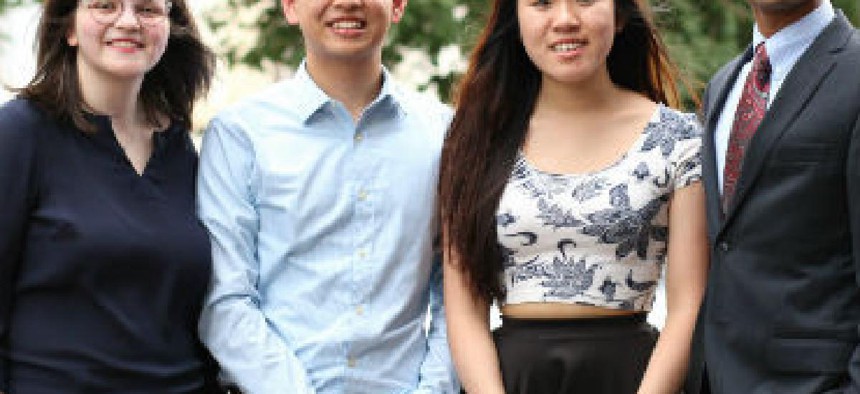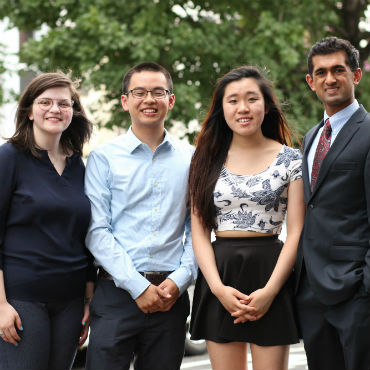A student-run solution to govtech skill shortages

A group of Harvard students just wrapped up the first year of a fellowship program they designed to create a tech skills pipeline for government.

The Coding it Forward board (l-r): Rachel Dodell, Chris Kuang, Athena Kan, Neel Mehta. (Photo credit: Karen Su)
Government agencies, especially civilian ones, often lament the difficulty in hiring skilled young technology talent, with millennial computer science grads often opting for higher-paying private-sector opportunities.
From the perspective of young outsiders, the biggest challenge to government careers isn't the work or difficulty adjusting to a workplace that doesn't accommodate commonplace apps such as Slack and Google Drive. For many, it's simply getting into government and seeing firsthand whether they like it.
In addition to the clunky, drawn-out application process, which serves as a poor first impression to bureaucracy for many, the limited tech-related openings in government tend to confine students to rote, training-level IT responsibilities, which can deter the talented young professionals agencies are trying to entice.
Three Harvard University students are testing their own solution for getting students into government. And on the heels of a promising inaugural summer, the students are already working on ways to make sure it lasts -- and more agencies are looking to participate.
Neel Mehta, Athena Kan and Chris Kuang launched the Civic Digital Fellowship in April in the hopes that their debut summer would give a handful of students the chance to work on technically intensive projects alongside federal employees. The fellowship is a project of the Coding it Forward initiative co-founded by Kan, Kuang and Mehta.
Despite the fact that the application period opened late in the semester, Kuang said the program received 226 applications from students at 80 schools within two weeks.
The Census Bureau originally planned to host eight fellows. However, Jeff Meisel, the bureau’s chief marketing officer, said that after officials saw the caliber and drive of the students, they quickly increased that number to 14 -- 11 undergraduates and three graduate students.
"There's no reason we can't have a cohort-based summer program for the government that competes with the summer programs at top tech companies," Meisel said. "To this point, it hasn't been presented [to students] in a way that is a good experience in terms of a recruiting process and a way to try it out before they commit."
Meisel, a former Presidential Innovation Fellow, said he had tried to launch a similar internship program after finding existing summer programs underwhelming, but the effort stalled. The Civic Digital Fellowship offered an opportunity to design a pipeline into government led by students and financially supported by the bureau.
To cover the students' housing, travel and other expenses, Meisel said Census carved out about $15,000 per fellow. The fellowship received two grants totaling $10,000 -- from the Shuttleworth Foundation and from Harvard’s Institute of Politics.
Although the students are temporary employees, Kuang stressed that "it's not an intern project" because of the complexity of the work and its relevance to the agency's mission.
Census officials didn't want the fellowship to be a basic internship program, either. To make sure students worked on projects relevant to the bureau’s mission, officials assigned a career employee to serve as a mentor to each fellow.
"One thing that was exciting about this program was the technical skills they were bringing were very strong," Meisel said. "They were very much working hand-in-hand with the existing team at Census."
The fellows' projects included making online offerings more mobile friendly, modernizing software development, redesigning websites and improving the accessibility of the bureau’s data.
Others linked Census data with that of third-party organizations, created a free online course on how to use the bureau’s data and helped with outreach to local communities in advance of the 2020 count.
After their initial tour in government, Kuang said many of the fellows "are now seeing this as a viable career opportunity."
Mariam Baqai, a rising junior at Mills College in California's Bay Area who interned last summer at the startup company that created the Waze app, said that before she heard about the about Civic Digital Fellowship, she "definitely did not see myself in a government role at all."
"Government seemed like this kind of faraway thing that wasn't accessible for me," she added. "As someone [who was] raised and goes to college in Silicon Valley, I never associated government with innovation."
Although there was a learning curve in adjusting to federal restrictions and technology she wasn't used to working with, Baqai said her experience was rewarding, especially compared to her friends who accepted private-sector internships and worked on "minuscule product features that nobody [without a technical background] is going to notice."
Because of the impact of her work and the support provided by Census leaders, "I felt so valued as a Census employee, not like an intern or fellow," she said.
With a successful debut under its belt, Meisel said Census is already working on next summer's program, adding that officials from the departments of State, Energy, and Health and Human Services and the Centers for Disease Control and Prevention have expressed interest in participating in the future.
Kuang said he has established good relationships with teams at the IRS and Environmental Protection Agency, and he hopes to kick off recruiting earlier next year to attract more fellows and better prepare them for the transition into government. He also expressed confidence in the future of the fellowship.
"The fellowship model is one that's built to scale," Kuang said. "We're showing [the program's] value through the work of our fellows."
NEXT STORY: White House announces expected federal pay bump


